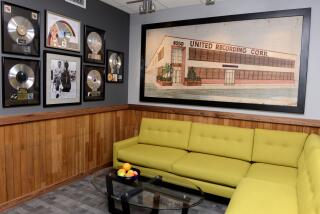Hansa is thriving on Cold War roots
- Share via
BERLIN — Hansa at the Wall recording studios stood within striking range of East German border guards patrolling the Berlin Wall and within easy reach of the decadent nightspots of the Cold War’s capital city.
It was this potent combination of Cold War standoff and hedonism that inspired David Bowie, Iggy Pop, U2 and Depeche Mode to tap into Hansa at the Wall’s shabby glamour to record some of the greatest pop music of the last century.
“We were in the shadow of the Berlin Wall. For many artists from Britain and America, that was very exotic. Some of them thought they’d need flak jackets and helmets,” said Tom Mueller, chief sound engineer at Hansa studios since 1972.
“The studio has a great sound, fantastic flair and a real creative spirit,” said Mueller, now in his 60s, reminiscing about old times as he stood in the converted 1910 ballroom that was Studio Two, one of Hansa’s main recording rooms.
Hansa is still going strong, but the old Studio Two is no more.
Since the redevelopment of the adjoining Potsdamer Platz area, the big studio, restored to its former grandeur, has reverted to its original role as a ballroom and concert hall, part of a post-unification cleanup of the capital which some Berliners say is destroying the city’s “cool” status.
In this room 25 years ago, Bowie recorded “Heroes,” the centerpiece in his influential trilogy of Berlin albums, during a time spent enjoying the Berlin nightlife with Detroit punk rocker Iggy Pop and New York maverick Lou Reed.
The old ballroom stood just 50 yards from Adolf Hitler’s bunker and was badly damaged in World War II. But the proximity to the Berlin Wall, the Cold War barrier between East and West, was the real draw for international stars.
Bowie moved to the Schoeneberg district in October 1976 and lived there as a semi-recluse for three years, having achieved worldwide fame as the creator of classic pop records like “Ziggy Stardust,” “Aladdin Sane” and “Space Oddity.”
“They had quite a wild clique, but Bowie is an extremely disciplined person. He knows his limits. That’s always true in my experience. The big stars are much more focused than the little bands,” Mueller said.
The high point of Bowie’s Teutonic phase was “Heroes,” with references to World War II and districts of Berlin divided by the Wall. Cold War angst is the background to the whole record.
The title song is a love story about two people trying to escape over the Berlin Wall, fantasizing about life in the affluent West, and it became an anthem when the Wall collapsed in 1989, something of which Mueller is clearly proud.
Bowie drifted away from Berlin after the third part of the trilogy, “Lodger,” but his success drew many other artists to Hansa studios, including Depeche Mode, David Byrne and, most famously, the Irish rockers U2.
In the autumn of 1990, U2 began work on “Achtung Baby,” produced by Daniel Lanois with Brian Eno, who also produced some of Bowie’s Berlin oeuvre, back in the studio. The record was a renaissance for U2 and sold more than 10 million copies.
“This room saw the beginning of U2’s big international success, and a lot of that was about the atmosphere of the city and the atmosphere in the studio,” said Mueller.
Ultimately U2 did not finish the record there, and its members have said their relationships with one another were under terrific strain in Berlin. However, images of the studio and other Berlin sights feature prominently in the sleeve art for “Achtung Baby.”
“The atmosphere was free from pressure, where artists could be creative,” Mueller said. “We tried to be like a hotel for the stars. We removed everything that could hinder their creative urges.”
Hansa is at the heart of new Berlin, near the headquarters of Sony Europe, but Mueller misses the days when it was a dusty, rundown creative hothouse.
“Nowadays, well, you can’t just throw a cigarette butt on the floor anymore. I don’t think heavy metal bands would feel so comfortable in this room.”
More to Read
The biggest entertainment stories
Get our big stories about Hollywood, film, television, music, arts, culture and more right in your inbox as soon as they publish.
You may occasionally receive promotional content from the Los Angeles Times.





